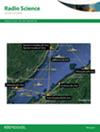Advanced hybrid optimization algorithms for energy efficient cloud resource allocation
IF 1.5
4区 地球科学
Q3 ASTRONOMY & ASTROPHYSICS
引用次数: 0
Abstract
Cloud computing is highly sought after for its dynamic resource allocation capabilities and pay-per-use model. However, previous research has identified several challenges, such as lower coverage, high integration rates, longer computation times, and complex operators, all of which are associated with NP-hard problems. These issues negatively impact the efficiency of resource allocation and scheduling, leading to slower processes, inefficiencies in multi-objective optimization, lower throughput, and higher power consumption. To address these challenges, we propose a unique Hybridized Optimization Algorithm that integrates Crow Swarm Optimization (CSO), Cuckoo Search Optimization (CSO), and Cat Hunting Optimization (CHO). Initially, Particle Swarm Optimization (PSO) and the Crow Search Algorithm (CSA) handle the exploitation and exploration phases to balance task loads. Subsequently, Cuckoo Search Optimization (CSO) enhances resource utilization and addresses NP-hard issues, while Cat Hunting Optimization (CHO) refines the search from global to local optimal spaces to achieve the best values. The results demonstrate that the proposed hybrid technique effectively reduces user request waiting times, lowers energy consumption, and decreases execution times on cloud servers compared to baseline approaches, thereby significantly improving overall system performance.节能云资源分配的先进混合优化算法
云计算因其动态资源分配能力和按使用付费模型而备受追捧。然而,之前的研究已经发现了一些挑战,例如较低的覆盖率、高的积分率、较长的计算时间和复杂的运算符,所有这些都与np困难问题有关。这些问题会对资源分配和调度的效率产生负面影响,导致流程变慢、多目标优化效率低下、吞吐量降低和功耗增加。为了解决这些挑战,我们提出了一种独特的混合优化算法,该算法集成了乌鸦群优化(CSO)、布谷鸟搜索优化(CSO)和猎猫优化(CHO)。最初,粒子群优化(PSO)和乌鸦搜索算法(CSA)处理开发和探索阶段,以平衡任务负载。随后,Cuckoo Search Optimization (CSO)提高了资源利用率,解决了NP-hard问题,而Cat Hunting Optimization (CHO)将搜索从全局优化到局部最优空间,以获得最优值。结果表明,与基线方法相比,所提出的混合技术有效地减少了用户请求等待时间,降低了能耗,并减少了云服务器上的执行时间,从而显着提高了整体系统性能。
本文章由计算机程序翻译,如有差异,请以英文原文为准。
求助全文
约1分钟内获得全文
求助全文
来源期刊

Radio Science
工程技术-地球化学与地球物理
CiteScore
3.30
自引率
12.50%
发文量
112
审稿时长
1 months
期刊介绍:
Radio Science (RDS) publishes original scientific contributions on radio-frequency electromagnetic-propagation and its applications. Contributions covering measurement, modelling, prediction and forecasting techniques pertinent to fields and waves - including antennas, signals and systems, the terrestrial and space environment and radio propagation problems in radio astronomy - are welcome. Contributions may address propagation through, interaction with, and remote sensing of structures, geophysical media, plasmas, and materials, as well as the application of radio frequency electromagnetic techniques to remote sensing of the Earth and other bodies in the solar system.
 求助内容:
求助内容: 应助结果提醒方式:
应助结果提醒方式:


